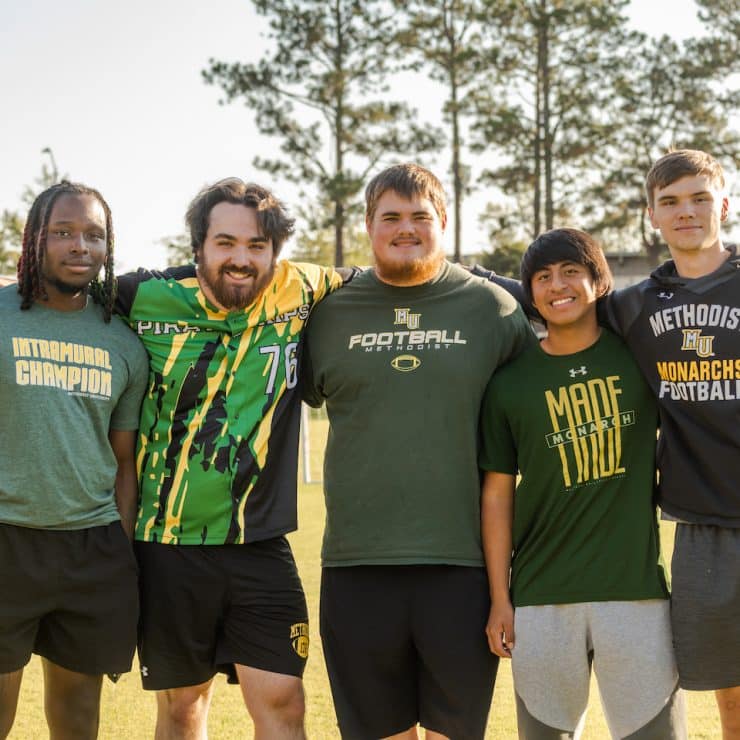
Student Affairs Policies
Standards & Expectations for MU Students
Methodist University educates students from around the world and supports individuals and communities through integrated teaching, research, and service programs. As a community of scholars, we aspire to:
- Act with integrity and honesty by the highest academic, professional, and ethical standards. (Integrity)
- Embrace civil discourse, respect and honor the dignity of each person, and foster a diverse and inclusive community. (Diversity and inclusion)
- Act responsibly and are accountable for our decisions, actions, and their consequences. (Accountability)
- Seek and create new knowledge and understanding and foster creativity and innovation for the benefit of our communities, society, and the environment. (Freedom of inquiry and Critical Thinking)
- Strive for excellence in all our endeavors as individuals, an institution, and a leader in higher education. (Academic Excellence)
- Work together for the betterment of our University, the communities we serve, and the world (Communal and Global Engagement/Service)
- Cultivate a culture that honors the sacred and encourages spiritual exploration for meaning and purpose. (Spiritual Attentiveness)
The Student Code of Conduct outlines the standards and procedures for maintaining a safe and conducive learning environment that supports Methodist University’s educational objectives.
The Division of Student Affairs at Methodist University is committed to upholding the university’s mission and values by providing compassionate interventions that respect the dignity of every student. This office ensures that community and university standards are maintained by involving students, including leaders of student organizations, in fair and impartial resolution processes. These processes encourage personal accountability and responsible decision-making, promote reflection and restoration, and reduce and prevent behavior that undermines student success and community safety.
The Student Code of Conduct Process
The student code of conduct process outlines the steps involved in examining and adjudicating reports of Student Code of Conduct violations.
Definitions of Prohibited Conduct
Maintaining a high quality of life in our community is very important to us. Read more below and visit the links referenced in the policy.
Conduct System
Any member of the Methodist University community may file a written complaint of alleged violations with the Associate Dean of Students, the campus conduct officer. The Associate Dean of Students has the right to collect additional information and further investigate the alleged violations.
Additional Information about Alcohol & Drugs
Methodist University is committed to students’ intellectual and personal development, which includes ensuring students have various and abundant opportunities to show care and responsibility for their own actions.
Hearing Bodies
The Student Community Court adjudicates minor violations that are not likely to result in suspension or expulsion, when responsibility is not freely admitted and/or there is dispute of evidence.
Appeal Process
Appeals for conduct cases that are adjudicated by the Student Community Court will be reviewed by the Dean of Students. Appeals for conduct cases that are adjudicated by Residence Life staff will be reviewed by the Student Community Court. Appeals for conduct cases that are adjudicated by the Vice President of Student Affairs, Associate Dean of Students, or Administrative Hearing Board will be reviewed by the Appeal Board.
Restorative Justice
In certain cases, misconduct has a significant impact on others in the community. Rather than using traditional adversarial procedures asserting authority over a student who caused harm, restorative processes may be utilized to give the impacted parties greater voice in the resolution.
Conduct Sanctions
Sanctions are applied and enforced at the time the student is found responsible. These penalties are not absolutes and may be amended to benefit students in particular situations.
Accused Student Rights
Students whose conduct is under review based on an alleged violation of the Code of Conduct have certain rights.
Additional University Policies
No Contact Orders
Methodist University offers No Contact Orders to individuals of the community who seek to avoid contact with another individual.
Silent Witness Program
Community members who have information or knowledge with regard to criminal or illegal activity may anonymously report that information through the Silent Witness program. Submissions should be made through the Web site below.
Student Organization Policies
Methodist University is committed to creating and sustaining a campus learning environment where students can immerse themselves in the dynamic student engagement activities provided to enhance the educational experience beyond the classroom.
Good Samaritan/Medical Amnesty Policy
Every Methodist University student is expected to exercise personal responsibility for their own health and safety, and every Methodist student has a responsibility to care for one another; therefore, this policy has been designed to save lives, and also applies to individual students who seek help for another student in need.
Peaceful Assembly Policy
Methodist University, as an educational institution, believes that the right of expression and inquiry is essential to both the pursuit and dissemination of knowledge and truth and that right must be guarded, protected, and preserved. Members of the University community, both individually and collectively, are therefore encouraged to express their views through the normal channels of communication. The University also recognizes the right of the individual to express his/her views by demonstrating peacefully and constructively for concepts and beliefs he/she wishes to make known.
Non-Academic Student Experience Complaints
Any student who feels that he/she has been unduly wronged or unfairly treated by a member of the University faculty, administration, or staff may appeal to have his/her grievance heard through the following processes. This procedure does not apply in situations involving grade appeals and student code of conduct issues. A separate procedure has been developed for those cases.